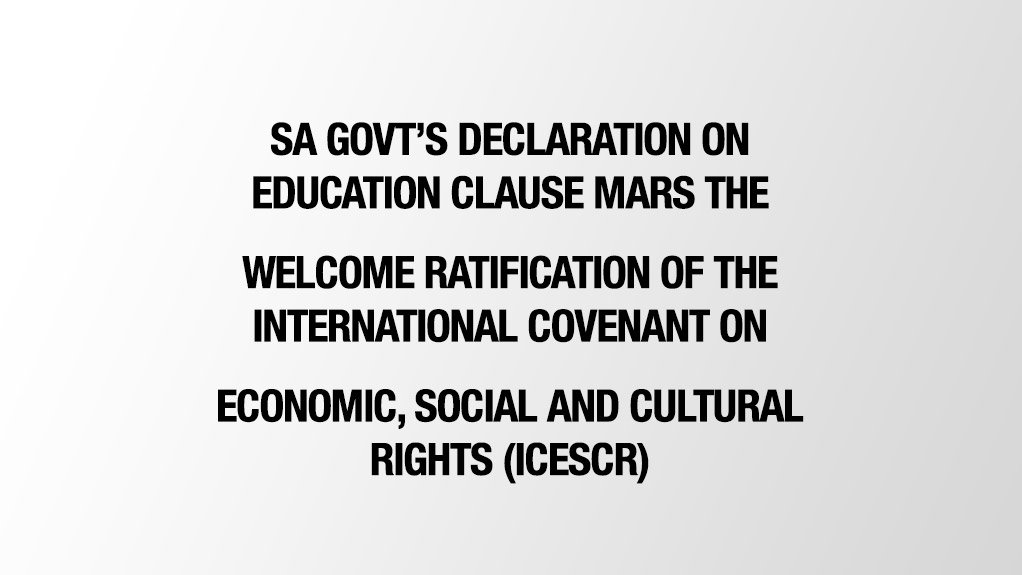- SA govt’s declaration on education clause mars the welcome ratification of the International Covenant on Economic, Social and Cultural Rights (ICESCR)0.08 MB
As South African organisations working to advance the rights to education, dignity and equality, we welcome our government’s ratification of the International Covenant on Economic, Social and Cultural Rights (ICESCR). But we are dismayed by the qualification made in respect of the right to education, which detracts from what is otherwise a moment to celebrate.
On 12 January 2015 the South African government ratified the ICESCR, more than twenty years after signing it. The ratification is set to enter into force on 12 April 2015. The ICESCR is an international human rights treaty of the United Nations (UN). It establishes an international framework for the protection and realization, by state parties, of socio-economic rights such as the rights to food, housing, healthcare and education. State parties that have ratified the ICESCR have a legal obligation to work towards the realisation of the socio-economic rights set out in the ICESCR. South Africa is the 163rd state party to this treaty.
We, as organisations working to ensure the realisation of learners’ rights to a basic education in terms of Section 29(1)(a) of the Constitution note with deep concern South Africa’s declaration in respect of the ratification process. This declaration states that:
‘The Government of the Republic of South will give progressive effect to the right to education, as provided for in Article 13 (2)(a) and Article 14, within the framework of its National Education Policy and available resources.’
This declaration signifies a deliberate intention by the South African government to misinterpret the right to basic education as enshrined in our Constitution. This is an attempt to qualify the unqualified nature of the right to basic education as set out in Section 29(1)(a) of the Constitution, the unqualified nature of which has been confirmed by the South African Constitutional Court in the case of Juma Musjid. In the judgment, Justice Nkabinde stated:
‘It is important, for the purpose of this judgment, to understand the nature of the right to “a basic education” under section 29(1)(a). Unlike some of the other socio-economic rights, this right is immediately realisable. There is no internal limitation requiring that the right be “progressively realised” within “available resources” subject to “reasonable legislative measures”.’
The declaration made by the SA government to qualify its ratification of the ICESCR is therefore a deliberate attempt to insert “progressive realization” and “available resources” qualifications into the right, qualifications which the Constitutional Court has expressly rejected in its binding interpretation of the Constitution. The SA government’s declaration also seeks to constrict this constitutional right “within the framework of its National Education Policy”. However, the policy should be drawn up to comply with the constitutional right, not the other way around. The declaration therefore undermines the Constitution.
The state of education across the country continues to be unequal and learners in township and rural schools continue to learn in harsh conditions. As was noted in a recent op-ed by Nic Spaull in the Sunday Times: “For each 100 pupils who started school in 2003, only 48 wrote matric in 2014. Of these, 36 passed and 14 qualified to go to university.”
It is within this context that we express our support for the ratification of the Covenant and our disappointment at the South African government’s attempt to water down its commitment to ensure access to quality and equal education for all learners.
Nevertheless, the ratification is still an important step forward for the protection and advancement of a wide range of socio-economic rights.
Joint statement by SECTION27, Equal Education, Centre for Child Law, Legal Resources Centre, Equal Education Law Centre
For more information contact:
· Faranaaz Veriava, SECTION27: veriava@section27.org.za
· Nombulelo Nyathela, Equal Education: nombulelo@equaleducation.org.za
· Ann Skelton, Centre for Child Law: Ann.Skelton@up.ac.za
· Sarah Sephton, Legal Resources Centre: sarah@lrc.org.za
· Dmitri Holtzman, Equal Education Law Centre: dmitri@eelawcentre.org.za
EMAIL THIS ARTICLE SAVE THIS ARTICLE
To subscribe email subscriptions@creamermedia.co.za or click here
To advertise email advertising@creamermedia.co.za or click here











